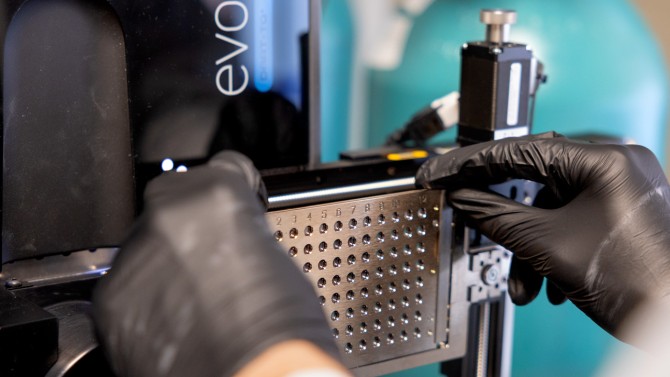In high-tech science, breakthroughs often hinge on the smallest details - like the step before the experiment even begins.
Before a lab can detect a contaminant in drinking water, find performance-enhancing drugs in an athlete's blood or measure volatile compounds in food, scientists must first extract the target chemicals from a tangle of other substances. It's a step called sample preparation - and it's one of the most frustrating bottlenecks in analytical science.
Now, a Cornell-born startup called Quantera Analytical thinks it has a fix.
Quantera's technology is deceptively simple: a modular, cartridge-based system that replaces slow and solvent-heavy workflows with rigid, reusable sample collectors. These cartridges can either absorb vapors above a sample or dip directly into liquids such as blood, juice or plant extracts.
That means scientists can process dozens of samples at once - faster, with less waste and without relying on costly centralized labs.
Quantera's modular, cartridge-based system potentially replaces slower and solvent-heavy sample testing with a new reusable sample collection tool.
"Our No. 1 company value is accessibility. That's something I've always been passionate about," said Terry Bates, Ph.D. '23, Quantera's founder and analytical food chemist. "Small growers and labs are often at a disadvantage because of the cost of this testing."
Quantera was recently admitted to Cornell's Praxis Center for Venture Development, an incubator that supports early stage companies with ties to the university. The center provides office and lab space, mentorship and access to Cornell's growing entrepreneurial ecosystem.
Admission to Praxis is highly competitive and signals that a company has strong commercial potential.
"This technology has the potential to address widely recognized pain points in pre-analytical workflows across multiple fields," said Bob Scharf, academic administrative director at Praxis. "Quantera hopes to level the playing field between large centralized corporate laboratories and in-field testing by reducing dependence on tedious and time-consuming sample preparation steps."
Admittance into the incubator will provide Bates with help refining his business plan, connecting with investors and navigating the complex world of product validation and intellectual property.
The startup's work has already drawn attention from Bruker, the German scientific instrument manufacturer where Bates previously worked. Bruker set up a collaboration with Quantera placing a state-of-the-art mass spectrometer in their lab to help validate the new system - a gesture that reflects the company's interest in faster, more flexible testing platforms.
"In graduate school I worked on a technology that made mass spectrometry more accessible, efficient and rapid," Bates said. "Bruker had purchased the technology from the company that was making it and developed an instrument that could be used in applied markets."
The startup has already filed patents for its core extraction device and a suite of accessories, including cartridge holders, gaskets and storage systems designed for high-throughput lab and field use.
Traditional sample preparation, known as solid-phase microextraction, uses delicate fibers to capture trace compounds before analysis by gas or liquid chromatography. The process is finicky, expensive and hard to scale. Quantera's rigid planar cartridges, arranged in standard well-plate formats, can withstand heavy use and eliminate much of the solvent waste that plagues current methods.
That could have implications far beyond the lab bench. It could speed food and beverage testing or environmental monitoring after a spill. And it could open new possibilities for decentralized analysis, where testing happens on-site instead of being shipped to central facilities.
"We've demonstrated that this approach works across a wide range of commercially relevant compounds, from food quality indicators and smoke-affected grape samples to agriculturally and clinically relevant compounds and markers of fungal contamination." Bates said. "The next step is scaling it so others can use it in their workflows."
Any new testing platform must pass rigorous validation before it can be used in clinical or regulatory settings, Scharf cautions, and scaling production hardware is no small feat. But Cornell's entrepreneurial support system - from its business incubators to alumni investors - has given Quantera a launchpad.
For New York state, it's also part of a larger story: how research universities are turning deep science into real-world innovation.
"We're engineers and chemists," Bates said. "But our goal goes beyond the technology, it's about stewardship. We're building tools that make analytical workflows more efficient, sustainable, useful, and accessible, helping the scientific community push the boundaries of discovery."







